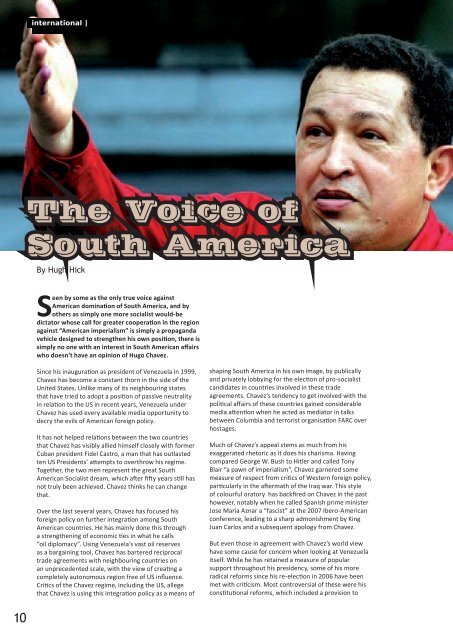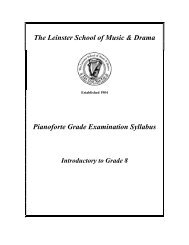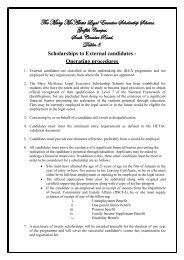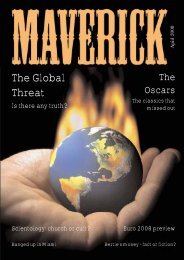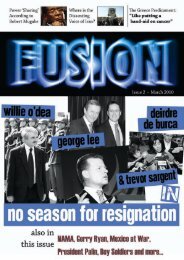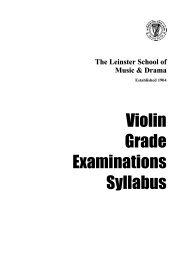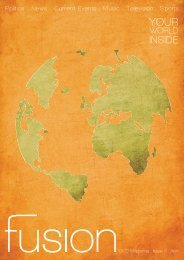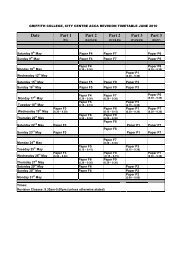Create successful ePaper yourself
Turn your PDF publications into a flip-book with our unique Google optimized e-Paper software.
international |<br />
international |<br />
“In comparing George W. Bush <strong>to</strong><br />
Hitler and called Tony Blair ‘a pawn of<br />
imperialism’, Chavez garnered some<br />
measure of respect..”<br />
10<br />
The Voice of<br />
South America<br />
By Hugh Hick<br />
Seen by some as the only true voice against<br />
American domination of South America, and by<br />
others as simply one more socialist would-be<br />
dicta<strong>to</strong>r whose call for greater cooperation in the region<br />
against “American imperialism” is simply a propaganda<br />
vehicle designed <strong>to</strong> strengthen his own position, there is<br />
simply no one with an interest in South American affairs<br />
who doesn’t have an opinion of Hugo Chavez.<br />
Since his inauguration as president of Venezuela in 1999,<br />
Chavez has become a constant thorn in the side of the<br />
United States. Unlike many of its neighbouring states<br />
that have tried <strong>to</strong> adopt a position of passive neutrality<br />
in relation <strong>to</strong> the US in recent years, Venezuela under<br />
Chavez has used every available media opportunity <strong>to</strong><br />
decry the evils of American foreign policy.<br />
It has not helped relations between the two countries<br />
that Chavez has visibly allied himself closely with former<br />
Cuban president Fidel Castro, a man that has outlasted<br />
ten US Presidents’ attempts <strong>to</strong> overthrow his regime.<br />
Together, the two men represent the great South<br />
American Socialist dream, which after fifty years still has<br />
not truly been achieved. Chavez thinks he can change<br />
that.<br />
Over the last several years, Chavez has focused his<br />
foreign policy on further integration among South<br />
American countries. He has mainly done this through<br />
a strengthening of economic ties in what he calls<br />
“oil diplomacy”. Using Venezuela’s vast oil reserves<br />
as a bargaining <strong>to</strong>ol, Chavez has bartered reciprocal<br />
trade agreements with neighbouring countries on<br />
an unprecedented scale, with the view of creating a<br />
completely au<strong>to</strong>nomous region free of US influence.<br />
Critics of the Chavez regime, including the US, allege<br />
that Chavez is using this integration policy as a means of<br />
shaping South America in his own image, by publically<br />
and privately lobbying for the election of pro-socialist<br />
candidates in countries involved in these trade<br />
agreements. Chavez’s tendency <strong>to</strong> get involved with the<br />
political affairs of these countries gained considerable<br />
media attention when he acted as media<strong>to</strong>r in talks<br />
between Columbia and terrorist organisation FARC over<br />
hostages.<br />
Much of Chavez’s appeal stems as much from his<br />
exaggerated rhe<strong>to</strong>ric as it does his charisma. Having<br />
compared George W. Bush <strong>to</strong> Hitler and called Tony<br />
Blair “a pawn of imperialism”, Chavez garnered some<br />
measure of respect from critics of Western foreign policy,<br />
particularly in the aftermath of the Iraq war. This style<br />
of colourful ora<strong>to</strong>ry has backfired on Chavez in the past<br />
however, notably when he called Spanish prime minister<br />
Jose Maria Aznar a “fascist” at the 2007 Ibero-American<br />
conference, leading <strong>to</strong> a sharp admonishment by King<br />
Juan Carlos and a subsequent apology from Chavez.<br />
But even those in agreement with Chavez’s world view<br />
have some cause for concern when looking at Venezuela<br />
itself. While he has retained a measure of popular<br />
support throughout his presidency, some of his more<br />
radical reforms since his re-election in 2006 have been<br />
met with criticism. Most controversial of these were his<br />
constitutional reforms, which included a provision <strong>to</strong><br />
end term-limits on the presidency, theoretically allowing<br />
Chavez <strong>to</strong> remain in power indefinitely.<br />
While Chavez insisted that the reason for this proposal<br />
was that the successful implementation of his socialist<br />
model would take longer than his term in office, its initial<br />
rejection in December 2007 was seen as the first major<br />
blow <strong>to</strong> Chavez’s regime. Its success when put forward<br />
again in February 2009 just cemented the view of his<br />
critics that Chavez was trying <strong>to</strong> build a dicta<strong>to</strong>rship<br />
through democracy.<br />
Perhaps the most worrying sign of a move in this<br />
direction by Chavez is his increasing stranglehold on<br />
the domestic media. As well as hosting his own weekly<br />
television show “Aló Presidente”, which is little more than<br />
a thinly-veiled propaganda vehicle, in 2006 Chavez also<br />
revoked the licence for RCTV, Venezuela’s second largest<br />
television channel, having accused them of supporting<br />
the failed 2002 coup d’etat against him.<br />
Any student of political his<strong>to</strong>ry will see the warning<br />
signs. Constitutional reform, media interference,<br />
creation of a cult of personality. While Chavez may<br />
give plausible reasons for each of these things, the<br />
fact remains that never before have such measures<br />
strengthened a democracy. Instead, they tend <strong>to</strong> be the<br />
last gasps of it before it is smothered by a swift change <strong>to</strong><br />
authoritarianism.<br />
I don’t doubt Chavez’s motives. No leader would take<br />
the risks he has done if it were only for personal gain.<br />
But the fact of the matter is strong ideologies, no matter<br />
how well meant, never work in democracies. Name me<br />
an extreme left or right leaning functioning democracy in<br />
existence and I’ll eat my hat.<br />
Perhaps Chavez is even under the delusion himself that<br />
he could make it work, that he could implement his<br />
social u<strong>to</strong>pia while under the constant scrutiny of a free<br />
media and the threat of being replaced every few years.<br />
Nonetheless, every step he takes <strong>to</strong>ward social reform<br />
will make it just that bit harder for him <strong>to</strong> give up power,<br />
and risk losing everything he’s worked for.<br />
Having said that, Chavez remains an important<br />
figure. He stands for a South America that needn’t<br />
be overshadowed by its bigger, uglier brother. The<br />
sheer scale of his ambition and will power make him a<br />
formidable character on the world stage. It may be that<br />
in time we will come <strong>to</strong> view him in a different light,<br />
but for a world that has seen capitalism crumble before<br />
its very eyes, Chavez has taught us one very important<br />
lesson: there is always an alternative.


